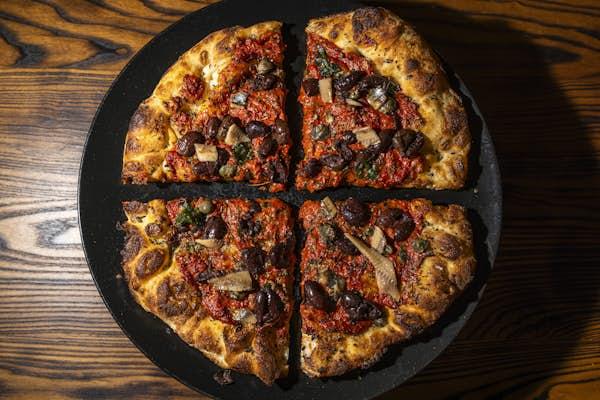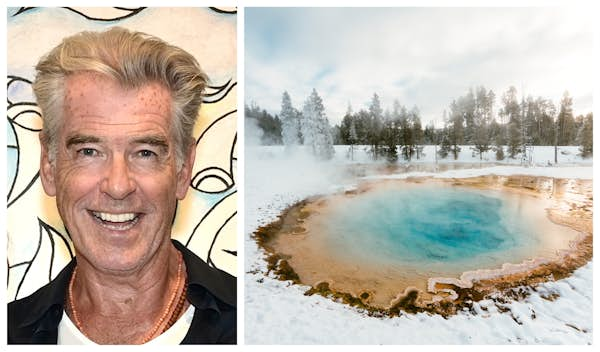I tried the world's best pizza of 2023 in Italy. Did it live up to its reputation?
Is a pilgrimage to Caserta for the top-ranked pizza in the world worth it? Read our writer’s account to decide for yourself.

Is a pilgrimage to Caserta for the top-ranked pizza in the world worth it? One Lonely Planet writer decided to find out.
Just north of Naples on the road south from Rome, Caserta may not be on your travel bucket list. But if you’re a fan of pizza, it probably should be – because it’s home to three of the 50 best in the world.
The list was compiled by 50 Top Pizza, an organization that sends “inspectors” across the world to suss out the world’s best slices. Two of the top international finishers them happen to be owned by the Martucci brothers – and I Masanielli di Francesco Martucci has just taken the number-one spot on the list for the fourth year in a row, almost as long as the guide has existed. Having booked on a lark a month before, I was lucky enough to find myself with a reservation less than five days after the 2023 list had been announced.
Francesco Martucci in his kitchen at I Masanielli, Caserta © Roberto SalomoneGetting there
Caserta is some 40km (25 miles) north of Naples, and 200km (125 miles) south of Rome. Historically, its importance has been linked to the Reggia di Caserta, a magnificent royal palace built for the Bourbon dynasty by Luigi Vanvitelli (the same architect who made sure the dome at St Peter’s in Rome won’t fall on your head). These days, Caserta’s historic center retains the charm of many southern Italian cities, with crumbling facades and narrow streets that should be pedestrian but aren’t, and is still dominated by the palace.
Unless, of course, you’re on the hunt for pizza.
There’s little about the exterior of I Masanielli that’s particularly charming. It’s in a commercial strip on an otherwise nondescript stretch of road, perched under a giant sign for the prenatal boutique next door. If you’re unfamiliar with the area, you may even think your map is deceiving you.
But take heart: from sushi counters in subway stations to chicken stalls at night markets, the best food is often found in the unlikeliest places.
Getting in
The experience begins with a roll call just before 7pm to make sure that those who have made reservations have arrived, at which point they open the velvet ropes and begin to let people inside. Be aware that arriving more than 10 minutes late will result in your reservation being canceled, true to the warning on the website (where you can easily book, in Italian or English). While there is a wait-list, don’t expect the odds to be in your favor, particularly on a weekend day when I Masanielli is open for lunch and everyone in the world has also thought about making a day of pizza and palaces. And while the hostesses and waitstaff may seem brusque at first (indeed, the entrance has imposing black ropes and stanchions like a nightclub where you hope to find your name on the list), they’re all very competently trying to manage international fame in a pretty small local setting. Be kind, be patient – and you’ll be fine.
I Masanielli performs the neat trick of creating a space that is both expansive and intimate, with an industrial aesthetic that feels neither forced nor cold. Moreover, although the dining room was crowded and full of movement, the noise level remained low enough to easily hear other diners at your table or the waiters announcing dishes. There’s no music, either – a small detail that feels intentional. There are no distractions from the matter at hand, no other sensory stimulation.
It’s all about the pizza.
Tucking in
I Masanielli offers two menus: a standard à la carte pizza menu with classics like a Margherita or Marinara (each cost €7, standard for nearly any pizzeria in Italy), as well as signature pizzas like the Tonno Rosso, with tuna belly, shallot cream, confit tomato and olive powder (€15). Those who want the full experience can opt for the pizza tasting menu, which costs €70 per person and features eight courses selected by the maestro himself, Francesco Martucci.
While €70 is not nothing, if you’re a pizza pilgrim or someone who likes to design their travel experiences around food, you may appreciate the novelty of eight triangles so perfectly presented that Pythagoras himself might queue up behind those velvet ropes.
Writer Virginia with the signature “five consistencies of onion” pizzaAs a woman of science, I chose the tasting menu, which began with a heavenly heap of gorgonzola and truffle atop a perfectly blistered crust, charred in all the right places. Francesco Martucci’s world fame also comes from the “triple-cooked pizza”: first steamed, then fried, then sent through the oven, adding crunch to the classic “crisp-and-chew” pizza texture. Nowhere does this technique shine brighter than on the signature “five consistencies of onion” pizza, which features the humble bulb in creamy, fermented, crunchy, charred and emulsified forms, all wed to a generous chunk of local fior di latte cheese. This thoughtful union of flavor and technique is playful without being frivolous. Indeed, it seemed like every pizza had its own purpose: the Domenica felt like the best remedy after a hard night out, and the Fiori di Zucca al Quadrato had the melancholy of the last wisp of summer.
Eating eight slices of pizza might seem like the sort of thing that Joey Chestnut would do for fun, but the quantities never feel overwhelming and are delivered with a calibrated frequency designed to make you feel full without feeling stuffed. The wine list is extensive, dividing selections into detailed moods that the sommelier was more than happy to discuss and suggest. For those who swear by pizza and beer, a wonderfully curated selection is up to the task of pairing with the world’s best. Both lists are affordable and approachable, as they should be.
The only glaring omission to I Masanielli’s offerings is the lack of coffee. If you’re the type who needs to finish a meal with an espresso, you’d best be prepared for momentary heartbreak. Still, traditional pizzerias do not serve coffee (or anything else, for that matter): they’re focused on the pizza, just as the bar is focused on the drinks. I Masanielli makes the choice to stick to tradition – and it’s an admirable one, I think. (I admit I thought so after I found a coffee.)
Three of the eight varieties on the pizza tasting menu, from left: Domenica (San Marzano tomato sauce, marchigiana beef brisket, Monte Lattari pecorino, dried Piennolo tomatoes and ragù mayonnaise); Barry Lindon (fior di latte, wild greens, tartare of Marchigiana beef brisket and aged ricotta; Fiori di Zucca al Quadrato (zucchini cream, smoked provola cheese, pistil hummus, kombu mayonnaise with colatura, grated aged ricotta and fresh mint) © Virginia DiGaetanoWhat makes it the world’s best?
It’s a fair question and a funny thing, if you think about it. Pizza has an infinite number of incarnations – yet it is, at its core, the seemingly simple alchemy of water, yeast and flour set to heat and brought to life. Everything else comes after, and no matter what may top or tail it, nothing can hide its failure, just as nothing can mute its success.
Great pizza is great in the same way that great music is great, or great art or great love. It simply is. And, let’s be clear, I Masanielli makes great pizza. It is incontrovertible and undeniable. It’s the Platonic form of pizza dough: leavened to its peak potential, leopard-spotted and structurally sound under all manner of topping. While I am no pizza expert, this meal made me reflect on all of the pizzas I’ve consumed in my long life, and to rethink my relationship to the Great Dough Disk. That alone must make it pretty special.
Still, if you’re curious, the criteria is stringent, and very detailed indeed.
Is it worth it?
Of all the strip malls in the world, should you end up in this one? Yes, you probably should.
The menu has real heart, and finding a place that is so singularly devoted to making one thing perfectly is always a treat. And there is a real sense of experience to I Masanielli: going to a town you may not otherwise visit, waiting anxiously on a line where you’ve already reserved, sitting down under the watchful eye of a pizza maestro (who’s often in the dining room): it all feels like a thing you’ll never forget.
I don’t know if it’s the best pizza in the world; perhaps that’s too subjective a word to even use in such a large conversation. But I do know that I’m still thinking about those onions, that gorgonzola and the leopard spots on that crust, wondering if I’ll ever see their equals again.
Besides the pizza, the magnificent Reggia di Caserta is the town’s other main draw © trabantos / ShutterstockHow to make it happen
Pizza at I Masanielli coupled with a visit to the Reggia di Caserta is a great day trip, manageable if you’re based in Rome and almost a no-brainer if you’re in Naples. Keep in mind that the Reggia is closed on Tuesdays and I Masanielli on Mondays, so if you want to do both you should plan for Wednesday through Sunday.
It’s simple to arrive by car or train from either Rome or Naples, and the train station is right in front of the palace. From there, I Masanielli is about a 10-minute walk, making everything easily accessible by foot. Be aware that the last train to Rome leaves just before 10pm – so maybe don’t opt for the tasting menu. But there’s a bar right in the train station. And the coffee isn’t half bad.




















